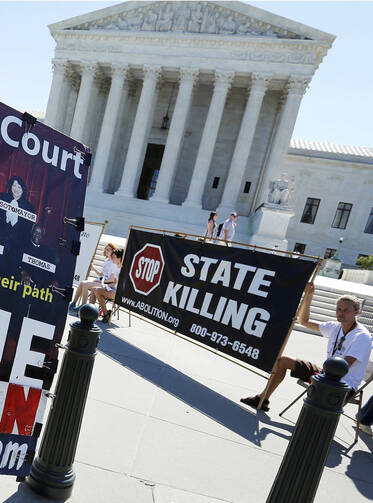The Catholic faith tradition "offers a unique perspective on crime and punishment, one grounded in mercy and healing, not punishment for its own sake," two bishops said in a statement renewing the U.S. Catholic Church's push to end the death penalty.
"No matter how heinous the crime, if society can protect itself without ending a human life, it should do so. Today, we have this capability," wrote Cardinal Sean P. O'Malley of Boston and Archbishop Thomas G. Wenski of Miami.
The two prelates are the chairmen, respectively, of the U.S. Conference of Catholic Bishops' Committee on Pro-Life Activities and the Committee on Domestic Justice and Human Development.
The message, dated July 16, commemorated the 10th anniversary of the bishops' Catholic Campaign to End the Use of the Death Penalty and their message "A Culture of Life and the Penalty of Death," which accompanied the campaign.
The U.S. bishops, who have long advocated against capital punishment, began the ongoing campaign in 2005.
It asks people to pray for victims of crime and their families and to reach out to support them. It also calls for educating people about church teaching on the death penalty and criminal justice; working for legislation to end capital punishment; and changing the debate in favor of defending life.
In November 2005, the bishops approved the statement on the death penalty calling on society to "reject the tragic illusion that we can demonstrate respect for life by taking life." It built on the 1980 statement by the bishops that called for the abolition of capital punishment.
"We urged a prudential examination of the use of the death penalty, with the aim of helping to build 'a culture of life in which our nation will no longer try to teach that killing is wrong by killing those who kill. This cycle of violence diminishes all of us,'" Cardinal O'Malley and Archbishop Wenski said in their joint statement.
The two prelates cited "significant gains" made on the issue over the past decade.
Several states, including New York, New Jersey, New Mexico, Illinois, Connecticut, Maryland and most recently Nebraska, have ended the use of the death penalty, and other states have enacted a moratorium. Death sentences are at their lowest level since the reinstatement of the death penalty in 1976.
In Kansas this past February, a measure to abolish the death penalty there ultimately failed, but the state Catholic conference praised senators for their "impassioned and thoughtful" debate on the issue.
Even with such progress, "there is still a great deal of work to be done, and we must recommit ourselves to end this practice in our country," said Cardinal O'Malley and Archbishop Wenski.
They also noted Pope Francis' call to end use of the death penalty and said that in light of the upcoming Year of Mercy that he declared, which is to begin Dec. 8, "(we) renew our efforts in calling for the end of the use of the death penalty."
"Pope Francis, like his predecessors, provides a clear and prophetic voice for life and mercy in calling for all people of good will to work to end the use of the death penalty," added Archbishop Wenski.
"In anticipation of Pope Francis' visit to the United States in September, we join our voices with his and continue our call for a culture of life," he said. "As a people of life, we say it is time for the U.S. to abandon use of the death penalty."








